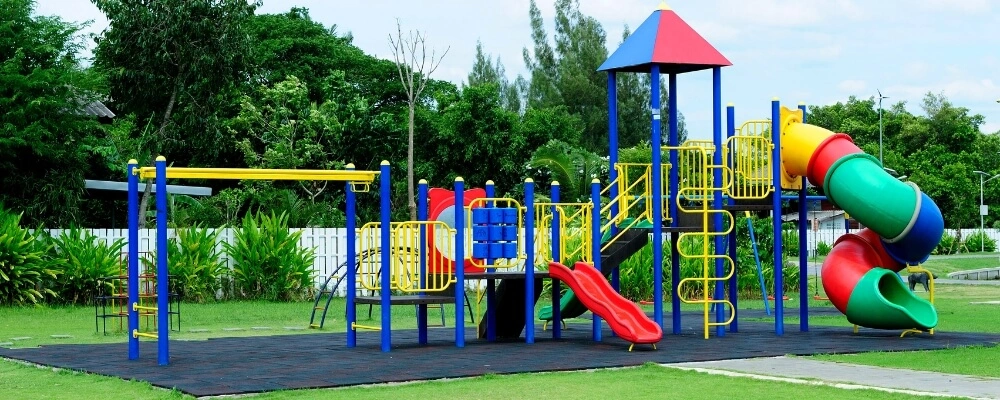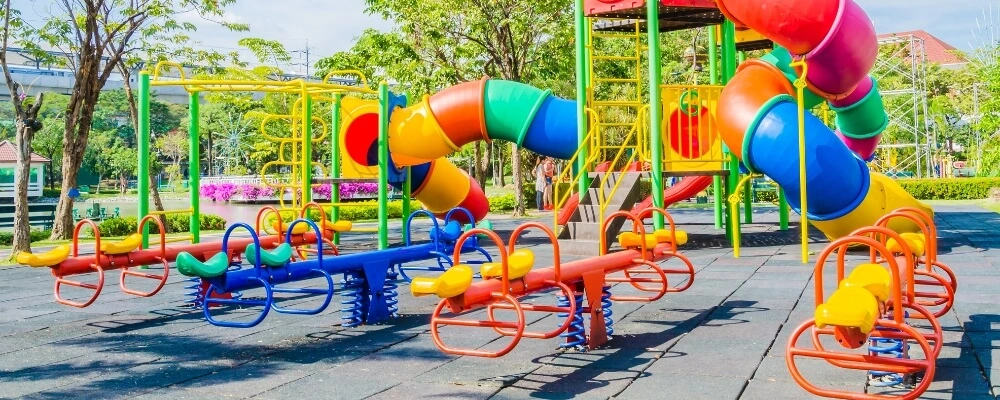Playgrounds offer a world of adventure for children, allowing them to explore, socialize, and hone their physical skills. These vibrant spaces, buzzing with laughter and activity, are integral to a child’s development. However, with all the fun comes the responsibility of ensuring safety. Every year, countless injuries, some even severe, occur on playgrounds across the globe.
As guardians of our young adventurers, it’s crucial for parents to be equipped with the knowledge to keep these play areas safe and enjoyable. In this guide, we present 15 essential playground safety rules that every parent should be well-acquainted with, ensuring our children can play, learn, and grow without unnecessary risks.
15 Playground Safety Rules Every Parent/Caregiver Should Know
As a parent, it is crucial to be aware of the safety rules for playgrounds to ensure your children’s safety while they play. These rules will help prevent potential injuries and guarantee that your child has a pleasant and secure time while playing. By following these straightforward rules, you can ensure that your child has a fun and safe experience at the playground.
1. Supervision is Key
The presence of a watchful adult is perhaps the most crucial factor in ensuring children’s safety on a playground. Kids, especially younger ones, can be unpredictable in their actions. Their ability to assess risks isn’t fully developed, making them more prone to dangerous situations. Adults can provide the necessary guidance, step in to prevent accidents, and react swiftly in case of emergencies.
Furthermore, children may not be aware of the proper use of certain playground equipment. A guiding hand or a simple reminder from an adult can make all the difference in preventing a fall or injury.
2. Appropriate Age Equipment
Playgrounds are often designed with specific age groups in mind. The equipment’s complexity and safety features are based on the intended age range. What’s suitable for a teenager may not be safe for a toddler.
Ensuring children use age-appropriate equipment minimizes the risk of injuries from being overwhelmed or under-challenged. Parents should look out for signage or instructions that indicate the appropriate age range for each piece of equipment.
3. Check Equipment Temperature
Equipment, especially metal ones, can become scalding hot on hot days. A slide, for instance, can cause burns on a child’s skin within seconds. Parents need to check the temperature of playground equipment during warm weather physically. A quick touch test can help determine if the equipment is safe or if it’s best to wait until it cools down.
4. Inspect for Hazards
Regular wear and tear or vandalism can render playground equipment hazardous. Before children start playing, parents should give the equipment a quick once-over to identify potential dangers.
This includes looking out for broken chains on swings, protruding nails or screws, sharp metal or plastic edges, and rusted parts. Any observed hazards should be reported to the appropriate authorities for repair.
5. Dress Appropriately
What a child wears to the playground can significantly influence their safety. Drawstrings on hoodies or pants, for instance, pose a strangulation risk if they get caught on equipment. Similarly, sandals or flip-flops might not offer the required grip or protection, leading to slips or injuries. Parents should ensure their children wear clothes free of potential tangles and shoes that are comfortable and protective.

6. Use Safety Surfacing
The ground material is pivotal in cushioning falls, common in playgrounds. Surfaces like rubber mats or wood chips offer a softer landing than concrete or asphalt. Parents should choose playgrounds that use such safety surfacing and ensure it’s evenly spread without any significant gaps.
7. Teach Safe Use
Children need guidance on how to use playground equipment safely. Simple reminders can prevent accidents. For example, instructing kids to go down slides feet first can prevent head injuries. Similarly, teaching them to wait their turn, especially on equipment like swings or slides, can prevent collisions.
Reminding them not to climb up slides ensures they don’t collide with another child coming down. Children can learn and internalize these safety behaviors through consistent guidance and reinforcement.
8. Avoid Wet Equipment
Wet surfaces can pose a significant slipping hazard, especially on playground equipment where kids often move energetically. Whether it’s due to recent rain or morning dew, moisture can make slides, swings, and climbers particularly treacherous.
Before children start playing, it’s a good practice for parents or guardians to quickly assess the equipment, wiping down wet surfaces if necessary. This simple step can substantially reduce the risk of unexpected slips and falls.
9. No Loose Objects
When kids play with or carry loose objects like toys or bags on playground equipment, these items can create trip hazards. Toys can be inadvertently left on steps or platforms, while bags can become entangled in equipment parts.
To reduce such risks, parents should designate a spot away from the play area where children can leave their belongings while they play, ensuring the playground remains clutter-free.
10. Keep the Play Area Clear
Beyond the immediate dangers of trip hazards, broader play areas must be kept clear to provide children with a safe environment. Items like bikes, scooters, and bags left scattered around can be obstacles children might not notice as they run around, leading to potential accidents.
By teaching children the importance of tidying up after themselves and using designated storage areas or racks, playgrounds can be kept safer for everyone.

11. Proper Behavior
Playgrounds are fun places, but without proper behavior, they can become grounds for accidents. Although often seen as harmless fun, roughhousing can lead to unintended injuries, especially in areas with hard surfaces or near equipment.
Similarly, throwing objects, even soft ones, can lead to unexpected injuries, particularly if they hit another child in the face or eyes. Parents and guardians play a crucial role in setting behavior expectations and ensuring play remains safe and inclusive.
12. Stay Within Designated Areas
Many playgrounds are strategically designed with fencing or barriers to protect children from external dangers, like nearby roads or water bodies. These boundaries are in place for a reason, and children should be taught to respect them. Venturing outside designated areas can expose kids to unforeseen dangers, from moving vehicles to unfamiliar terrain.
13. Be Aware of Strangulation Hazards
Some everyday play items or accessories can become potential strangulation hazards in a playground setting. If caught in the equipment, objects like jump ropes or necklaces can pose serious risks.
It’s essential for parents to be aware of these potential dangers and either avoid bringing such items to the playground or ensure they’re stored safely while children play.
14. Stay Away from Moving Parts
Moving equipment parts, like the undersides of swings or the pivot points of seesaws, can be particularly dangerous. Children who wander into these areas risk being hit or pinched. It’s vital to teach children to recognize and avoid these zones, ensuring they wait at a safe distance when waiting for their turn on such equipment.
15. Report Unsafe Conditions
Playgrounds require regular maintenance to remain safe. Over time, equipment can wear down, become damaged, or even break. Parents and guardians who notice such issues play a vital role in community safety by promptly reporting these conditions.
Whether it’s a loose bolt, a broken swing chain, or inadequate surfacing, bringing it to the attention of the responsible party helps ensure a timely fix, keeping the play environment safe for all children.
Conclusion
Navigating the playful chaos of a playground might seem daunting, but with the right knowledge, we can create a safe haven where our children can thrive. As parents, our foremost duty is to ensure the well-being of our young ones, even as they climb, swing, and explore. By understanding and implementing these 15 safety rules, we not only foster a secure environment but also instill in our children the importance of safe play.
Remember, the goal isn’t to curb their enthusiasm or adventure but to guide them in a direction where they can enjoy their childhood to the fullest, free from harm. Together, let’s make every trip to the playground a fusion of fun, learning, and above all, safety.





